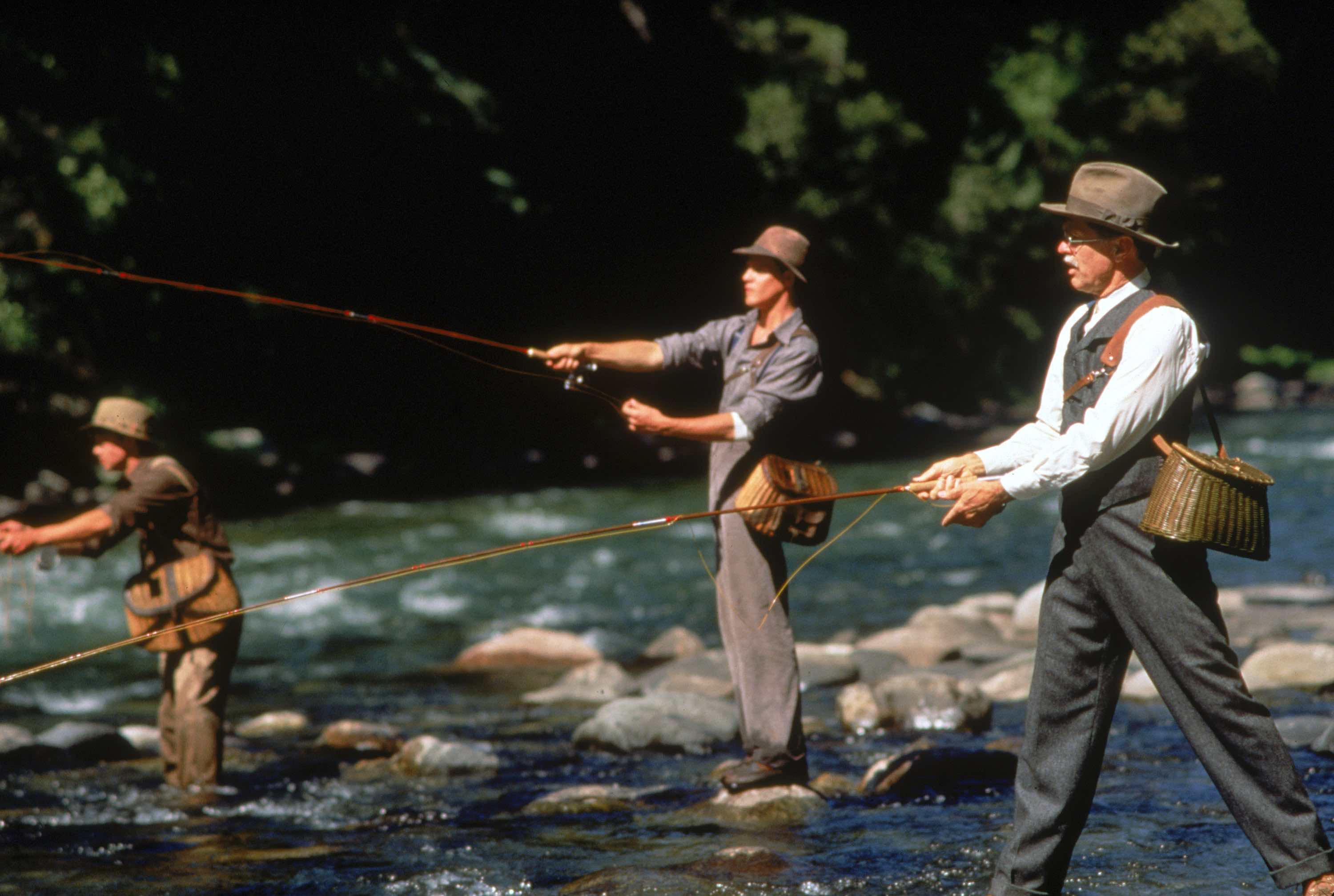Grace comes by Art, but Art Does Not Come Easy.
— Norman Maclean
Norman Maclean’s A River Runs Through It is in the main about family, and in particular about brothers, and on the side about fly fishing and art. The underline on family and brothers is “help,” on fishing is “religion” and on art is “suffering.” My family is not all together different, except where it counts most—fly fishing is conspicuously absent, as is a father to instruct it and the religion that accompanies it. The void acts as a placeholder for—nothing. No “thing” in the Augustinian sense of evil as an absence of good. I call it “pain” because that’s what fills the empty space that a father once occupied.
Maclean’s gift of story-telling relieves my pain on two counts. First, he gives me insight into the mysterious bond of brothers, the kind that Shakespeare spoke of in denigrating beds and honoring scars. He showed me that rites of passage occur in one-parent households the same as they do in two. The leaves of his book are healing like the leaves of John’s tree in the New Jerusalem. It too is fed by a river that runs through it. Both are open to anyone who wants to fish for words of life, although the Maclean family would say that they can’t be found by bait fishing because “grace comes by art.”
Secondly, the Gospels encourage those who fish and find the words of life to become in turn “fishers of men.” In working through his own tragedy, Maclean’s words invited me to transcend the pain associated with the guilt of single-parent inadequacies. I was caught in his net of words. He ends the novel as an aged man alone on the river with nearly all those he loved and did not understand dead…he hopes for a fish to rise—I did. He tells me:
The river was cut by the world’s great flood and runs over rocks from the basement of time. On some of the rocks are timeless raindrops. Under the rocks are the words, and some of the words are theirs.
Now this turn of phrase is difficult for the literary scholars who vary in opinion as to what it means. How can “rocks” have “words” of their own? Christ asserts “stones” indeed have a voice (Lk 19:40), as does the Old Testament (Hab. 2:11). The interpretive framework for Maclean’s A River is the Christianity of his father, a Presbyterian minister who lived in it, viewed the world through it, and taught his community and boys of it. Words are the centerpiece of Maclean’s story, and words are at the center of the universe, for creation was made by them. A River begins with John the Apostle of love whose first words to us were these: “In the beginning was the Word, and the Word was with God, and the Word was God” (Jn 1:1).

As artists, and word-smithing is an art, the Maclean boys were led to believe the disciples were all first-class fly fisherman “and John, the favorite, was a dry-fly fisherman.” That is, he was the best in sport (and art). Dry-fly fishing is a difficult angling technique due to the manual dexterity it requires, as well as the understanding of the fish in its environment. It is a beautiful analogy for literary apologetics, in which the best of writers observes the nature of things and ever so gently casts his words upon the cultural currents where the “faster and slower moving waters mix” around the rocks. The fisherman’s goal is to keep the fly from “dragging” and this requires “mending” the line, something writers are all too familiar in.
Reverend Maclean instructed his boys thoroughly in the Word of God and in how to excel in the artistry of words. Both of them became professional writers. Later in the novel, Norman approaches his father on the bank of the river where he is reading the Greek New Testament, as was his habit. He tells Norman: “In the part I was reading, it says the Word was in the beginning, and that’s right. I used to think water was first, but if you listen closely, you will hear that the words are underneath the water.” His father links the accounts of the Genesis creation and John’s recreation, both of which are underwritten with “words.” Norman argues that the water is forming the words, but his father insists that words came first, just as John did in his Gospel.
After the tragic death of his youngest son Paul, Reverend Maclean tells Norman that he should write a story in order to understand what happened to his brother and why. This is because he believes, as he stated earlier that the “words” come first. Not only was the Reverend encouraging his son toward catharsis, but he was encouraging me. Tragedy takes on many faces, sometimes it is the death of a child or a sibling … other times it is the death of a marriage, a husband, a father.
I knew already, as Norman did of Paul, that my youngest son was going to master everything he did, including growing taller than his brother. He has those “extra things in life” that counterbalance the hard Providence of being fatherless. Like Paul, he too is a risk-taker. His exhausting teenage drive to climb local water towers in our county didn’t tempt his older brother in the least. It wasn’t because he didn’t like adventure, but getting muddy in a Forerunner is quite different from driving it off the cliff. The Maclean brothers held the same tension between them.
Nothing in life is a guarantee, even when you play it safe. My boy’s father was a minister too. By the time my youngest son turned seven his father was long gone, and eventually long-dead. Life for us was a losing streak, and everything past that point is a high-stakes wager. Maclean recalled after fishing with his father and brother for the last time:
We sat on the bank and the river went by. As always, it was making sounds to itself, and now it made sounds to us. It would be hard to find three men sitting side by side who knew better what a river was saying.
The river running through the fatherless life is navigated in the rough waters of the rapids where the rocks have no fewer words—they are just harder to hear. When Norman tried to communicate with his brother across the river, the canyons caused the words to echo so that they were out of order. No matter how hard the brothers tried, the river said “No!”
We are a stubborn race, as Maclean’s story illustrates. The best of families suffers with or without a father. C.S. Lewis argues in The Problem of Pain that there is no clear line between pain and religion. Or between pain and art for that matter. As Lewis explains:
We are, not metaphorically but in very truth, a Divine work of art, something that God is making, and therefore something with which He will not be satisfied until it has a certain character … over the great picture of his life—the work which he loves, though in a different fashion, as intensely as a man loves a woman or a mother a child—he will take endless trouble—and would doubtless, thereby give endless trouble to the picture if it were sentient. One can imagine a sentient picture, after being rubbed and scraped and re-commenced for the tenth time, wishing that it were only a thumb-nail sketch whose making was over in a minute. In the same way, it is natural for us to wish that God had designed for us a less glorious and less arduous destiny; but then we are wishing not for more love but for less.
Reverend Maclean agreed with Lewis, he “was very sure about certain matters pertaining to the universe. To him, all good things—trout as well as eternal salvation—come by grace and grace comes by art and art does not come easy.” As a jovial gesture of good fun and a challenge to Paul, Reverend Maclean did not let his last “beautiful” catch come easy. With all the strength he could muster he threw a rock in Paul’s fishing hole. If his father had not disturbed the waters Paul would have never moved down stream, would have never came behind his father to re-fish the area, and would have never exhibited such a level of artistry in fly fishing. In fact, he invented the art of “shadow casting.”
We simply don’t know why God throws rocks in our lives. Why, like the river, he said “No” to my boys having a father, or the Maclean’s enjoying a son and a brother. What we do know is that Norman Maclean honored both his father and brother in writing A River. Norman remembered the words painted on the Sunday school walls, “God Is Love”: “We always assumed that these three words were spoken directly for the four of us in our family and had no reference to the world outside.” Though he maintained he was a religious agnostic in interviews, Norman Maclean answered his agnosticism with a story pierced through with love and faith. He philosophizes in A River that understanding comes at sunrise when “everything is luminous but not clear.” It is the turn into “Little Prickly Pear Canyon, where dawn is long in coming” and you have to pay close attention to the road in the “semidarkness” that a revelation dawns.
Yet even in the loneliness of the canyon I knew there were others like me who had brothers they did not understand but wanted to help. We are probably those referred to as “our brother’s keepers,” possessed of one of the oldest and possibly one of the most futile and certainly one of the most haunting instincts. It will not let us go.
His shared insights into brotherhood helped me to stop blaming myself when I could not fill the empty void for my boys. Jane Austen declared “What strange creatures brothers are!” They often elude my basic feminine instincts especially when it comes to sibling rivalry. The place where you realize that your brother is a man often starts with a street-fight according to Maclean. It is inevitable my boys would get into one big fist fight—which also would be the last.

The conflict simmered from the time their father left. My younger son was ready to exact a pound of flesh for an ounce of offense. Crossing him meant there would be hell to pay: “A brother offended is harder to be won than a strong city: and their contentions are like the bars of a castle” (Proverbs 18:19). Fathers referee and mediate between boys, but his absence doesn’t negate the need for scores to be settled. When it came, it was just as Maclean described it “like the Battle Hymn, terrible and swift.”
There are parts of it I did not witness; it started in a different area of the house but made its way toward the kitchen. It was not wise to step in between two boys over six-foot each. It wasn’t me though that paid the price for standing in the middle. It was my oldest son. He lowered his defenses for a split second to calculate the chances of hitting his mother. He had already done that a few years prior when I tried to help him practice baseball. I wasn’t prepared for curve balls, a thing boys like quite a lot. The black eye took some time to heal.
My younger boy had no such restraint. He measured life in millimeters instead of inches. Punches thrown, like balls, can be precise (they don’t have to make the curve) and height makes a world of difference in what one sees as risk. It was at that moment that he landed the punch, knowing his five-foot-three mother for all her stretching and blocking was in no real danger. He was meant to see opportunities, and take them. Every window that raises, every door that opens is always, always meant to walk through, climb through and if needed, crash through.
The fight suddenly stopped itself with a mother in the middle, just as the one between the Maclean brothers did. Norman asserts at the beginning of the novel:
When you are in your teens—maybe throughout your life—being three years older than your brother often makes you feel he is a boy. We had to be very careful in dealing with each other. I often thought of him as a boy, but I never could treat him that way.
That day in our home was less about settling a score and more about what it cost to do so, which I think is the right lesson. Maclean always wondered if he or his brother were tougher, “but if boyhood questions aren’t answered before a certain point in time, they can’t ever be raised again.” I think because doing so would be to raise Cain.
Author John Steinbeck spent a lot of time thinking about the archetypical brothers and the imitation of the father. He illustrated these dynamics in the novel East of Eden, the title indicating the direction Cain went after murdering Abel:
Tom, the third son, was most like his father. He was born in fury and he lived in lightning. Tom came headlong into life. He was a giant in joy and enthusiasms. He didn’t discover the world and its people, he created them… He lived in a world shining and fresh and as uninspected as Eden on the sixth day. His mind plunged like a colt in a happy pasture, and when later the world put up fences he plunged against the wire, and when the final stockade surrounded him, he plunged right through it and out.
This world needs boys like Tom and my younger son, but toughness isn’t always measured by brute force or enthusiastic living. The one who lands the punch is not always the winner—sometimes it is the one who voluntarily receives it because he counted the cost to others and it was too high for them to pay. This is what Christ did on the cross, he received the punch, and it was finished. He was the ultimate “brother’s keeper.” It’s up to us if we will receive the divine help. Reverend Maclean wondered what he could have done to “help” his youngest son. I often wonder what I might have done differently in raising my boys. What “help” could I give them? For as he so clearly articulated:
Either we don’t know what part to give … or more often than not, the part that is needed is not wanted. And even more often, we do not have the part that is needed. It is like the auto-supply shop over town where they always say, ‘Sorry, we are out of that part.’”
I didn’t have the “part” that would help my boys the most, and I would never have it. With the abandonment and death of their father, we were East of Eden in a territory I did not plan on entering or know how to navigate. We were shooting the rapids together with bloodied knuckles, black eyes, and bruises inside and out. T.S. Eliot says that love within a family is not “looked at” but “lived in…. All other love finds speech. This love is silent.”
Like the Macleans, we are listening for those inaudible, but not imperceptible, words underneath the rocks in the river that runs through our own lives. Norman Maclean, a professor of English literature at the University of Chicago passed away four months after I married in 1990. He didn’t know how meaningful his words would be to a single mom in a rural town in Arkansas. When Reverend Maclean asks Norman regarding his brother “do you think your mother helps him when she butters his rolls?” he answered, “She might…In fact yes. I think she does.” These simple lines that Maclean may have seen as inconsequential in his short novel were the words I pondered most. The part I can give my boys is small and in the trifles, but it is daily like the bread we are to seek from our Heavenly Father, to whom all fish rise. Norman Maclean was “haunted by waters”—I am haunted by grace.






9 comments
Patty Roberts
Barbara, this chapter is haunting and powerfully written. You are clearly a masterful wordsmith. Having been out of touch for over twenty years, I am not familiar with the twists and evidently painful turns your life has taken, but your ability to weave together literature, scripture, and personal experience creates an almost irresistible pull on the reader’s mind and emotions. I don’t have your level of education or literary expertise, but if you’d like to contact me, I could make a few very minor mechanical comments. Thanks so much for sending us the link.
Mark Jones
The story is artfully written drawing the reader in to consider the challenges of life. It is the empty places or voids that sometimes bring out the greatest questions or pain. Barbara is able to draw us into her story, which is also a shared story, through the words of Scripture as well as through some great literature. Grace can be like the rocks thrown into a calm pond in which the impact can be heard in the impact as well as seen through the ripples cascading across the water. Grace can also be like rocks thrown into rapids. We may not hear its words but it is still present.
April Christensen
Profoundly beautiful and exquisitely written.
Barbara is a master painter, but her brushstrokes are her words and sentences.
A must read for every believer.
Nannette Ramsey
I applaud your insight and guidance in this story. Knowing intimate details o your life makes it even more uplifting.
Amy cook
A must read!!! Thanks for sharing.
Elizabeth Nolan
I am the fifth of seven children, four girls and three boys. Our father died when the oldest was ten and the youngest three months. My mother was 33. Ms. Castle’s description of boys growing to manhood, and all that such entails, resonates with my vivid memories of observing my brothers through our shared childhoods. When a brother has sisters, occasions arise when he learns what it means to protect someone else, even someone who seems to stand in his way and thwart gratification. The brother closest in age to me, without my knowing, visited a boy in our neighborhood and ended a cycle of bullying in which I had been the victim. I did not ask him to intervene and do not know what my brother said or did, but I was not spit at or taunted again. I have never forgotten what it felt like when I understood what my brother had done for me. A sense of confidence in my family and my life was restored. You are right to compare parenting to shooting rapids. Skill and experience may see you safely through, and other times it’s just luck, or perhaps grace. Your essay is one I am printing out to read again.
Barbara Castle
Elizabeth – thank you for reading. Your comments prove the larger point I am attempting to make and that is that literature is a form of “art” that goes “fishing” for men. The story pulled you to the surface (just as it did me) because you associated meaningful events in your own life (even though different in detail) — to mine and to Maclean. His genius is seen when he can touch both of us – who have surface level different stories to tell from his – yet he seemed to “know us” on a deeper level, just as the novel states that Paul knew the mind of the fish, and thus the right fly and technique to use to catch them.
Comments are closed.